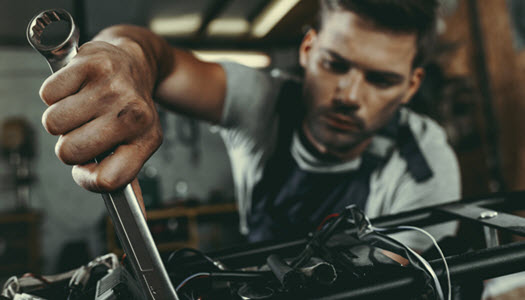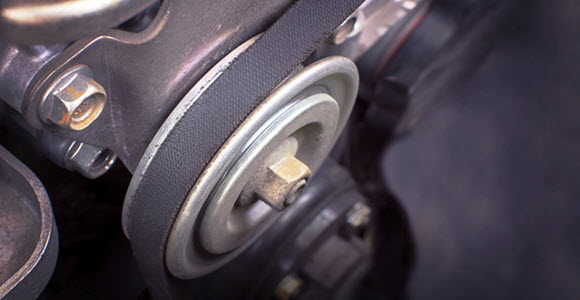Why It Is Important to Service Your Car’s Timing Belt
Posted on | 24 Jun 2018 By Anita Gaal
Your car is made up of thousands of intricate parts and pieces, all of which affect your car’s performance to one extent or another. Some parts are more significant to your vehicle’s functioning over others, and this is certainly true in the case of the timing belt. Your timing belt performs a critical function for your car, and without it your car would be rendered useless. Furthermore, it’s important to know just what could happen if your timing belt fails—as this might motivate you to stay on top of maintenance. This article will discuss the important role your timing belt plays in your car’s performance, what can go wrong with it, and how you can avoid timing belt issues over the life of your car.
What Does the Timing Belt Do for Your Car?
The timing belt, also referred to as the cambelt or timing chain, is responsible for “timing” your engine appropriately. The precision timing that your engine relies on for various valves to open and close at the exact right interval must be maintained by the timing belt. This ensures that the different cylinders are firing at the right time. Your timing belt is exposed to high temperatures and severe engine conditions, which can cause the belt to wear over time and require replacement. If the timing belt isn’t working properly, your engine will experience concerning symptoms, such as: starting issues, ticking noises, oil leaks, and engine misfiring.
The Quality of the Belt Itself
Since the timing belt is made up of a rubber material reinforced with other materials like nylon, it is inevitable for the belt to eventually wear. Usually your automotive specialist will be able to tell if the timing belt needs to be replaced simply by looking at it. If the belt is losing material, cracking, or beginning to stretch, then it’s time for it to be replaced.
Misalignment
Another issue that can occur with the timing belt, especially if it is undergoing material damage or structural changes, is misalignment. When the timing belt isn’t properly aligned, it usually leads to other concerning symptoms such as intense vibration throughout the car, higher than average engine temperatures, and concerning noises coming from the engine or timing belt itself.
The Effects of a Damaged or Broken Timing Belt
If you have a damaged timing belt, it’s only a matter of time before it snaps under the hood. While the timing cover usually shields your engine from this somewhat, timing belt failure can cause catastrophic damages to your engine—especially if you’re traveling at higher speeds. This is why it’s most important to service and replace a defective timing belt before it fails completely.
Ongoing Inspections and Other Routine Maintenance
As we said before, your automotive specialist will likely be able to tell if your timing belt needs to be replaced simply by looking at it. Therefore, ongoing inspections are a huge factor in preventing timing belt failure and serious engine damage. Other routine maintenance, such as consistent oil changes, can help regulate the other conditions under the hood, such as managing excess friction and heat that the belt becomes exposed to. Acting preventively with all of your automotive maintenance procedures is critical for your vehicle’s overall health and performance, but it can spare you significant repair costs in the long run. While the cost of a timing belt replacement can be costly, the ramifications of a broken timing belt might be irreparable—and if they can be repaired, you’ll be looking at a hefty automotive repair bill!

What We Can Do to Help You
The automotive repair and maintenance experts here at Euro Automotive have helped countless clients from all over the areas of Dallas, Garland, Arlington, and Fort Worth, TX, address timing belt issues. Since timing belt failure can be such a damaging occurrence, and the part plays such a huge role in your engine’s functioning, we act preventively to ensure that the timing belt doesn’t fail before it’s recommended servicing. As the local dealership alternative for specialty European automotive maintenance and repair, we help our clients follow their manufacturer maintenance plan for up to 25% less than nearby dealerships. If you’d like to have your timing belt inspected, please call us right away—your vehicle’s safety is of the utmost importance to us.















